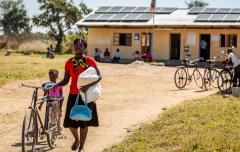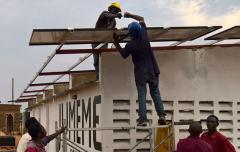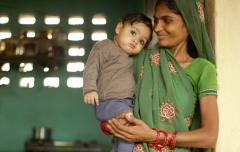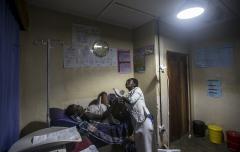JUMEME’s business model for mini-grids reaping multiple benefits in Tanzania
To support the fight against COVID-19, Tanzanian mini-grid company JUMEME is providing free electricity to the 10 healthcare facilities that are currently connected to its mini-grids. Nine more facilities soon to be connected will also be receiving free power.
Leo Schiefermueller, responsible for the Africa market of RP Global, the majority owner of JUMEME, says this recent act was simply “the company’s way of helping out by providing an essential service to the communities where we operate.”
It is another example of the company’s keen awareness of the productive uses of electricity, specifically how electricity can power more than individual households but larger community development and economic activities.
In fact, Schiefermueller says the company is built on a “productive use business model for mini-grid development.” The model has several advantages for both the communities where JUMEME builds its mini-grids, but also in alleviating some of the financial challenges associated with developing mini-grids in rural areas with low-income populations.
“To have a business model based on the demand of electricity from rural households only is very difficult, and therefore you need to find creative ways to build value through different means.”
With this in mind, since its inception, JUMEME’s strategy has been to identify opportunities for its mini-grids to become embedded in local economies. With its first-ever project on Ukara Island in Lake Victoria, JUMEME experimented with what it calls its KeyMaker Model. In short, JUMEME sought to create a mini-grid business with an additional arm that supports the local fishing industry.
This pilot project involved building the mini-grid to offer power to local residents, but also running a business that bought fish from local fishermen, processing and freezing them on-site using its own electricity, and then selling the frozen fish to distributors for sale across Tanzania. The presence of JUMEME in the value chain provided fishermen with greater market potential and higher prices for their fish because of access to burgeoning middle-class consumers in cities like Dar Es Salaam.
The pilot was successful on several fronts. First, JUMEME now employs five local personnel involved in the operation of multiple mini-grids on Lake Victoria, with seven more people contracted to help with fish processing at these sites, and another seven for transportation of the fish. It purchases from approximately 50 local fishermen.
Meanwhile, using lessons from the pilot JUMEME has expanded and now has 12 mini-grids in operation on Lake Victoria islands, connecting roughly 5,000 customers and supplying an area of roughly 80,000 people with electricity. A further 11 mini-grids are currently being completed, providing a further 5,300 connections, and the company is planning a third scaling phase that it hopes will start construction by the end of 2020.
The common denominator between all these mini-grids is that JUMEME has carefully selected communities where a mini-grid can be integrated into existing economic activities to boost its output, or where it can be the base for essential public services.
JUMEME engages with local stakeholders before a project is developed so that the company can account for specifications that will ensure its mini-grid is configured to local infrastructure needs. For example, JUMEME has tailored its mini-grids to specifically provide power to milling operations, to re-establish local water treatment, and to power health centres. Thanks to the reliable power connection provided by JUMEME, the health centre in Bwisya has even developed into a hospital.
The potential to power much-needed services is attractive to the communities themselves but also project financiers, particularly grantors, who are looking to maximize the impact of their investment in terms of job creation or catalyzing community development, says Schiefermueller. He adds that JUMEME’s ability to attract grant funding has been pivotal to the company’s scaling over the past few years and argues that grant funding is a crucial piece for making mini-grids more viable across Africa. “Grid infrastructure in the Western world is always financed through public means, so we should expect the same to happen in Africa,” he says.
What JUMEME has proved thus far is that investment in mini-grid businesses can translate into broad public benefits, including livelihoods for local entrepreneurs and quality services that preserve people’s health.
Photo credit: JUMEME




